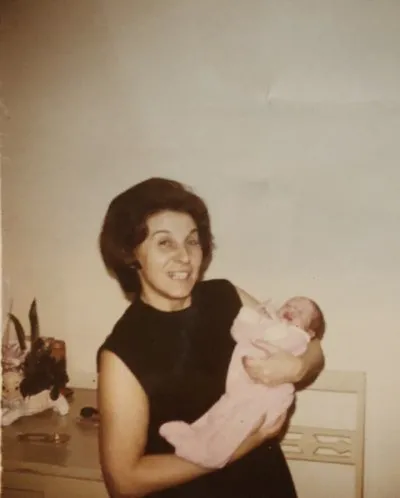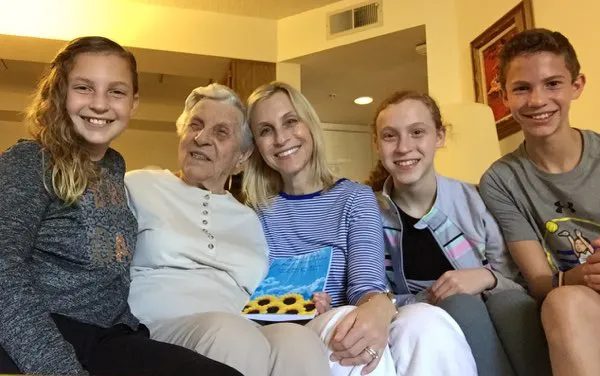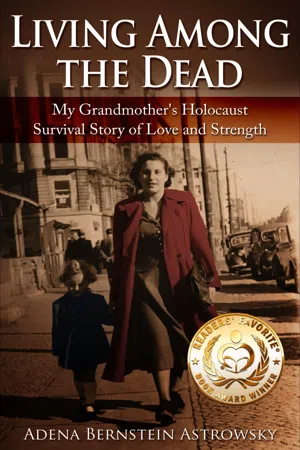Bubbie was a daughter, sister, wife, mother of two, grandmother of five, great-grandmother of ten. And she was a Holocaust Survivor. This is about her life — or at least the bits and pieces of that life that she shared with me in conversations and in her writings. She spoke of her earliest childhood memories and of living through the Holocaust.
Her story is now history. But, because she somehow miraculously survived horrific events and unimaginable degradation, her family, her faith, and her hope — they survive, too.
Like most members of my generation, born three decades after the end of World War II, I came to this story with almost no real understanding of the plight of Jews in the Holocaust, much less that of my own grandmother.
Adena held by her grandmother, right after she was born, April 1971
I grew up in a lovely home surrounded by family and friends. I was involved in many activities at school and by all measures was a normal, happy kid. But growing up I couldn’t help but notice what is often called “presence of absence” on my mother’s side of the family.
When we got together with family on my father’s side, there were so many aunts and uncles and first cousins.
One of my cousins nicknamed me ‘#9’ and I refer to him to this day as ‘#5’, signifying the birth order of first cousins on my father’s side. But on my mother’s side, I grew up with only one aunt, who got married in my early teens.
While I was in high school, she and my uncle had two daughters. And, of course, there was my grandmother, my Bubbie. So, compared to my father’s side, my mother’s side of the family was very small. Sometime during my high school years, I began to grow curious about the significance of this difference.
As my grandmother’s first-born grandchild, I was very fortunate to have spent a lot of time with her throughout my life.
Shortly after I was born in Maryland, my family moved back to Canada (my parents had lived in Montreal prior to my birth) and moved into the same apartment building as my grandmother in Cote St. Luc, Montreal.
Each day my mom and I sat in my bedroom and looked out the window waiting for my grandmother to return from her job as a bookkeeper. When she got home, she would often take me from our ground level apartment to hers on an upper floor where we would spend time together playing and talking.
This allowed my parents to spend some time alone together when my father returned from work. Now, as a parent of three, I can appreciate how important those moments can be without a toddler running around! (On a side note, if you look at photos taken of me during these early years, you can see a noticeable weight gain because my grandmother took this time to feed me cookies that I enjoyed so very much!)
My sisters were born within the next few years and we soon moved to a home in Dollard des Ormeaux, a suburb of Montreal.
I have warm and wonderful memories of these times I spent with my grandmother. I remember playing a game in which she’d spin me around in her green laundry basket. She would also make dolls out of towels for my sisters and me, something she continued to do for my children when they were toddlers. She also drew pictures of pussycats, something she later taught my children how to do.
My favorite memory? That would have to be the sugar cookies she’d make from a recipe she remembered from when she lived in Germany. I can close my eyes and still see her using the same cookie cutters over and over to make these delicious treats.
In 1976, the election in Quebec involved three political parties. The victorious party (‘Partie Quebecquoise’ led by Premier Rene Leveque) won with 40 percent of the vote. They were a separatist party whose goal was for Quebec to secede from Canada and operate as an independent country. They installed a plethora of new rules, many of them about language making it harder for businesses to operate. To send a child to an English-speaking school, for example, at least one parent had to have attended one of these schools.
My parents wanted to send me to a Hebrew school in the United States that taught English and Hebrew. They had to file application papers, and my aunt on my father’s side who lived in New York had to vouch for us, in order for us to be allowed to enter the United States. Therefore, because of the political and economic issues in Montreal, my family ended up moving to Arizona.
After living in Arizona for five years, my mother became a citizen and then filed the government papers necessary for her to move my grandmother to Arizona, which she eventually did in 1985. My father owned his own dental business and my grandmother went to work there as the firm’s bookkeeper. My grandmother always lived close to us, and so was able to be with us for all religious holidays, some of our vacations, and other important family occasions.
Growing up so close to her was indeed a blessing as it allowed me to spend a lot of valuable time with her, getting to know her, and creating some fabulous memories that continue to nourish me to this day.
My grandmother was an avid reader. She loved reading books, especially those by James Michener, Leon Uris, Fyodor Dostojevsky. After finishing War and Peace by Leo Tolstoy, my grandmother joked with my mother about how difficult it was to pronounce the long names used in the book as they went “on and on.”
Bubbie also loved music, especially if composed by Johann Strauss II and Frédéric Chopin. She also enjoyed operas such as The Merry Widow, Rigoletto, and La Bohème. My mother told me she recalled being a teenager in the 1950s when my grandmother would ask her to teach her the “cha-cha” and jitterbug. She just loved to dance!
With the birth of my children, my grandmother said it really brought home to her how — despite the unimaginable magnitude of his hatred and violence — Hitler had failed to wipe all Jews off the planet.
The lone survivor in her family, she had given birth to two daughters, who in turn birthed her five grandchildren. And then those grandchildren grew up and had babies of their own. She was a great-grandmother to even more little human beings. When she thought about that, she was visibly moved.
Not only I, but my three children, too, were fortunate to spend a lot of their childhood with her. They experienced the same doll-making activities, the drawing of pussycats on paper, and eating sugar cookies shaped by the same cookie cutters she’d used when I was a child.
Each December we would go visit her on her birthday with a bouquet of sunflowers — a flower that always reminded her of her childhood home and garden. Running down the hallway, we would see her standing outside her apartment door waiting for us. My children would often yell out, “Happy Birthday, B-Bubbie,” to which she would vehemently shush them because although her true birthday was in December, she still used the fake (or inherited) birthday of March on all her paperwork. And although WWII was long over, she was still nervous someone would find out or a Nazi was lurking nearby.
It even humored us to see the birthday fliers posted in the elevators and on the walls of the assisted living facility she spent her last few years at, listing her name under the “March Birthdays” for residents that month.
Occasionally though, I did experience impatience when my children would complain of being ‘starving.’ Invariably, these incidents evoked in me memories of my grandmother’s description of how, during the war, she would be forced to go days, even weeks, with little to no food and scarcely any water.
I would feel myself tensing up as I reminded them that they certainly were not “starving.” And I would tell them how their great-grandmother once spent fifteen days hiding in an attic with hardly a bite of anything and only a sip of stale water to drink. Of course, they grew tired of this response and I tried to remind them of their great-grandmother’s survival story each and every time they complained of starvation.
A few years before my grandmother passed away, I began thinking about the need to collect all the poetry and prose she had written. I wanted to make sure everything was kept safely for my children and their children and their children’s children.
As I read through her writings, I realized there were many details of her survival that she had not captured on paper. With that in mind, I watched her taped interview with Steven Spielberg’s Shoah Foundation, and began connecting this verbal storyline to her own writings.
Understandably, most survivors have a difficult time talking about what they witnessed and experienced. This was certainly the case with my grandmother. As I mentioned earlier, she never offered a simple answer to any of my questions. So, I started spending more time with her every chance I had, with my laptop in tow, asking her questions and documenting her answers, trying to fill in the blanks.
On one such occasion, my son Zachary and I joined her for dinner in the little restaurant at her assisted-living facility to get more details on a particular topic. I don’t remember now what that topic was, but I do recall that instead of discussing it, she decided to tell Zachary and me all about the sunflowers that grew wildly in her family’s garden when she was a child and how, even to this day, sunflowers reminded her of her childhood home. To her, they were a beloved symbol of all that was good before the war. It was a beautiful, and meaningful, digression in our conversation.
Once the draft version was complete, my kids and I brought a copy to her. I remember how emotional she got and how thankful she was because her story, her history was now documented and preserved for all the generations that come after her.
There is something simultaneously poignant and incredibly important about not forgetting these stories. Second and third generation survivors need to assume the responsibility for keeping these stories alive.
Gabby, Bubbie, Adena, Sarah, and Zachary.
That realization was the spark that led me to author the first version of this book. My grandmother passed away two months after she received her copy.
Some family members speculated that she continued living until the publication of the book because “knowing your roots” was so important to her.
The last night she was in the hospital before moving to hospice care, my twins, Sarah and Zachary, visited her. Their B’nai Mitzvah was approximately one week away.
Although my grandmother was not a particularly religious person, she asked them to recite for her their Tor...




